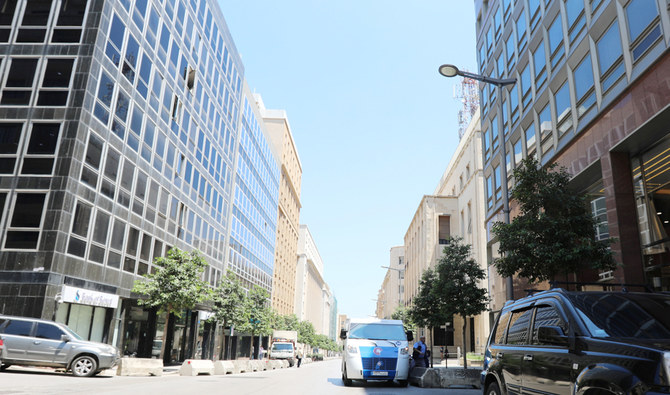BEIRUT: Former Lebanese President Amine Gemayel asked: “Who controls power now in Lebanon? Is it the legitimate authority, or illegitimate armed groups? Who controls Lebanon’s destiny? Is it legitimate armed institutions, or illegitimate ones — whether Hezbollah or any other group?”
Gemayel added that the state is “searching for solutions away from legal and financial ones related to the well-being of the country, by (working) alongside the Central Bank of Lebanon to nurture the treasury and financing its expenditure from private bank deposits of residents or expatriates.”
Gemayel also complained about “the absence of good governance and total absence of the political authority with regards to handling the current crisis in Lebanon,” noting the “indifference of many states, and the lack of interest of brotherly and friendly states in helping Lebanon under the current government and situation.”
Lebanon’s ongoing crisis is set to worsen in the near future, with a $1.2 billion Eurobond due on March 9. Its total debt is around $30 billion, divided between banks and investment funds.
Opinion
This section contains relevant reference points, placed in (Opinion field)
On Wednesday, Lebanon formally requested technical assistance from the International Monetary Fund (IMF) to tackle its economic crisis. Minister of Finance Ghazi Wazni said meetings with an IMF delegation in Beirut are still in their “consultative stage to help Lebanon set a rescue plan.”
His media office said: “Deliberations are taking into consideration all available data and possible options based on the delegation’s evaluation of the situation in Lebanon.”
Wazni claimed: “Lebanon has set a plan to face and resolve the crisis, and (has asked) that the IMF give its point of view in light of the current situation regarding the challenges and ways to overcome them, in addition to the economic and financial reforms that Lebanon needs.”
Twelve legal and financial consulting firms have reportedly made offers to give advice on the best options to restructure Lebanon’s debt and prepare for negotiations with creditors.
Lebanese President Michel Aoun told Ján Kubis, the UN Special Coordinator for Lebanon, “Solutions are in place to resolve the financial and economic crisis in collaboration with the IMF.”
According to Auon’s media office, “The measures that will be adopted aim at protecting the finances of Lebanon and the rights and interests of its citizens.”
FASTFACT
On Wednesday, Lebanon formally requested technical assistance from the IMF to tackle its economic crisis.
Kubis urged the Lebanese authorities to implement the promised reforms and gave his assurance that the UN “supports the reforms that the government intends to undertake.”
Prime Minister Hassan Diab said: “The crisis that we are passing through today is unprecedented in the history of Lebanon — even in the 1980s and 1990s, when the Lebanese Pound faced sharp decline, the situation was different. Lebanon is going through a turning point in its history and our government is working day and night to find solutions within 30 days to a 30-year crisis.”
As the government is reportedly considering postponing the payment of the Eurobond and negotiating a restructuring of its debt, the exchange rate of the dollar to the LBP remains as high as LBP2,450 or 2,500 for $1 in exchange offices, while the official exchange rate remains LBP1,515 for $1.
The Lebanese Bakeries and Ovens Unions warned on Friday of “new burdens due to the increase of the US Dollar exchange rate,” and called on the state to “satisfy the country’s wheat needs, as citizens cannot bear more pressure.”
Nicolas Chammas, president of the Beirut Traders Association, expressed the concern and anger of the commercial sector regarding the Lebanese political class. “Ever since the war in Syria erupted nine years ago, our situation has been in steady decline due to displacement, smuggling, unfair competition and mismanagement by the state,” he said. “One week before protests erupted, more than 100,000 merchants staged sit-ins in front of their shops and (gave warnings about) the serious situation they were passing through.”
The protests, he claimed, “have exacerbated our problems due to the impossibility of transferring money, and restrictions on bank deposits which made us strive for survival.”
On the streets, tensions were again running high this week, as supporters of the Free Patriotic Movement (FPM) staged a protest in front of the Central Bank in Hamra Street. FPM demonstrators clashed with supporters of the Progressive Socialist Party (PSP) for the first time — due to rumors that the FPM supporters intended to move their protest to the nearby house of PSP leader Walid Jumblatt — before the army intervened to separate the two sides. Jumblatt later asked his supporters to disperse.



























